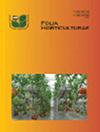Perceived functions of allotment gardens and their importance during the COVID-19 pandemic in Poland
IF 2.2
4区 农林科学
Q2 HORTICULTURE
引用次数: 3
Abstract
Abstract This article describes the changes taking place in the functions of allotment gardens, their perceived value, reasons for purchasing allotments and subjective (self-reported) assessments of their importance during the pandemic. A questionnaire survey was conducted among 203 owners of allotment gardens located in three highly urbanised cities in the Silesian Voivodeship (Southern Poland). Semi-structured questionnaires and non-standardised questionnaires were used to collect the data. The results demonstrate that the respondents aged above 61 years (38.5%) have observed a generational change in the function of allotments, from cultivating fruits and vegetables to recreational purposes. Regardless of age, the owners of allotment gardens did not notice any technological progress or new crops. The young respondents (21–30 years) treated allotment gardens as an investment (36.7%), while the respondents aged below 20 years and over 61 years declared that the greatest benefits of allotment gardening are improved health and growing one’s own fruits and vegetables. The respondents aged over 41 years (25.9%) also pointed out the importance of growing their own produce. Allotments were especially important during the pandemic as a private space free from COVID-related restrictions. Extended interviews with the respondents revealed that allotment gardening was perceived as a coping strategy for the stress generated during the lockdown. This study showed that allotment gardens are important sites not only for food production but also for maintaining mental health, social capital and environmental engagement.分配花园的感知功能及其在波兰COVID-19大流行期间的重要性
摘要本文描述了分配花园功能的变化、其感知价值、购买分配的原因以及对其重要性的主观(自我报告)评估。对西里西亚省(波兰南部)三个高度城市化城市的203名分配花园业主进行了问卷调查。采用半结构化问卷和非标准化问卷进行数据收集。结果表明,61岁以上的受访者(38.5%)观察到分配功能的代际变化,从种植水果和蔬菜到娱乐目的。无论年龄大小,分配花园的所有者都没有注意到任何技术进步或新作物。年轻受访者(21-30岁)将分配花园视为一种投资(36.7%),而年龄在20岁以下和61岁以上的受访者则表示,分配花园的最大好处是改善健康和种植自己的水果和蔬菜。年龄在41岁以上的受访者(25.9%)也指出了种植自己的农产品的重要性。在疫情期间,作为一个没有新冠肺炎相关限制的私人空间,分配尤为重要。对受访者的长期采访显示,分配园艺被视为应对封锁期间产生的压力的一种策略。这项研究表明,分配花园不仅是粮食生产的重要场所,也是保持心理健康、社会资本和环境参与的重要场所。
本文章由计算机程序翻译,如有差异,请以英文原文为准。
求助全文
约1分钟内获得全文
求助全文
来源期刊

Folia Horticulturae
Agricultural and Biological Sciences-Horticulture
CiteScore
3.40
自引率
0.00%
发文量
13
审稿时长
16 weeks
期刊介绍:
Folia Horticulturae is an international, scientific journal published in English. It covers a broad research spectrum of aspects related to horticultural science that are of interest to a wide scientific community and have an impact on progress in both basic and applied research carried out with the use of horticultural crops and their products. The journal’s aim is to disseminate recent findings and serve as a forum for presenting views as well as for discussing important problems and prospects of modern horticulture, particularly in relation to sustainable production of high yield and quality of horticultural products, including their impact on human health.
 求助内容:
求助内容: 应助结果提醒方式:
应助结果提醒方式:


